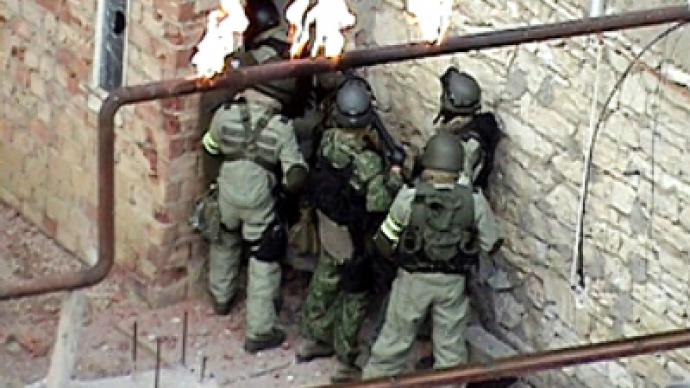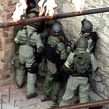
Will Abu Usman Gimrinsky Become the Dagestani Insurgency’s New Amir?
Publication: Eurasia Daily Monitor Volume: 12 Issue: 91
By:

For the first time since the death of the Caucasus Emirate’s last leader, Abu Muhammad (Aliaskhab Kebekov), near the city of Buinaksk, on April 19 (Vdagestan.com, April 20), one of his possible successors, Abu Usman Gimrinsky (Magomed Alievich Suleimanov), issued a statement. Amir Abu Usman is the qadi (Sharia judge) of the Caucasus Emirate’s Dagestani Velayat and at the same time the leader of the Mountainous Sector of Dagestan.
The 39-year-old amir comes from the village of Gimry, in Dagestan’s Untsukul district. In 1992, Abu Usman entered Fatah al-Islami University in Damascus. In 2005, he returned to Dagestan and became the qadi of the central mosque in Gimry. Within a year, Abu Usman became well known across Dagestan as a just judge. People from all corners of Dagestan asked him to resolve their issues on the basis of sharia law. In 2006, Abu Usman joined the insurgency and received the status of Dagestan’s qadi. In 2007, the then-amir of the Velayat Dagestan, Seifullah, appointed Abu Usman to another position—that of amir of the Mountainous Sector of Dagestan. However, in 2008, under pressure from villagers and relatives, Abu Usman surrendered, returned to the village and was amnestied by the authorities. In 2009, Abu Usman again joined the armed Islamic opposition movement. The Muslim cleric was convinced that the security services and the government were after him. The life of a Salafi who criticizes the government in Dagestan is not secure. The cleric acquired authority among the rebels by also being critical of the rebels themselves. Abu Usman insisted on applying the same sharia law standards to the militants as to everybody else, including on such sensitive issues as extortion businesses. The cleric condemned such practices and sought to stop them. One of the best-known examples was Abu Usman’s verdict on extortion carried out by Ibragim Gajidadaev, who extracted payments from every business he could find (Politrus.com, April 30).
The authorities suspect Abu Usman of ordering the death of Dagestan’s most famous Sufi sheikh, Said Chirkeisky, who was killed on August 28, 2012, in his own home by a female suicide bomber, Aminat Kurbanova (Vdagestan.com, accessed May 14). That, however, is by all indication a Russian security services allegation aimed at turning the hundreds of thousands of followers of the slain sheikh against Abu Usman, depriving the latter of support in Untsukul district, including his home village of Gimry.
Abu Usman sharply criticized his colleagues in the Caucasus Emirate who switched their allegiance to the Islamic State (YouTube, December 24, 2014). In his video address, he cast doubt on IS leader Abu Bakr al-Baghdadi’s right to call himself the caliph. This unequivocal condemnation will not help to bridge the gap between the supporters of the Caucasus Emirate and those who left the organization and pledged allegiance to the Islamic State. Thus, if Abu Usman is appointed as the new leader of the Caucasus Emirate, the crisis in the organization is likely to deepen against the backdrop of multiple successful special operations carried out by the Russian security services in Dagestan.
Abu Usman’s articles have been published on the websites of the armed Islamic opposition in the North Caucasus, which the Russian government officially outlawed as extremist sources that cannot be legally referenced by publications on Russian soil (Sova-center.ru, May 7, 2013).
It should be noted that Abu Usman is popular not only among the militants. Russian security services and the military have repeatedly put pressure on the residents of Gimry in recent years to convince them to hand over Abu Usman and his followers. However, despite the enormous trials that Gimry residents have endured, they did not turn him in; moreover, they helped him hide. Without support from the villagers, Abu Usman’s people would not have been able to survive in the mountains (Flnka.ru, April 12, 2014).
Residents of Gimry who lost their homes after multiple successive mopping-up operations now reside in the temporary village of Vremenny (meaning “Temporary” or “Interim”). The last large-scale mopping-up operation in Vremenny took place on September 14, 2014, and involved units of the military, the police and the Federal Security Service (FSB) (Memo.ru, September 29, 2014). Government forces literally plundered the village during that operation, and it was evidently not due to official oversight or insubordination. The commanders of the counter-terrorist operation in the area knowingly allowed the looting, apparently to punish villagers collectively for supporting the militants. Residents of the village literally lost all their belongings, and their appeals to President Vladimir Putin and the Dagestani leadership remained unanswered. The village of Gimry is not only the birthplace of the two famous imams of Dagestan, Imam Shamil and his predecessor Imam Gazi-Mulla. It is also the heartland of mountainous Avaria, so events in this village reverberate across all the Avar communities in Dagestan. The insulting and robbing of the Avars of Gimry by the security forces affected all the Avars who live in Dagestan. The Avars are the largest ethnic group of Dagestan. The primary reason for the failure of Moscow’s policy in this region is its ignorance of the psychology of its targets.
Whether Abu Usman is elected to the position of Caucasus Emirate leader or not, he will remain an important person for the entire armed Islamic underground. Abu Usman has equal chances with two other candidates, but ultimately the choice depends on foreign actors rather than on those who live in the Caucasus. The Caucasus Emirate’s activists in Turkey will determine who will lead the organization. They will try to choose the person who can do the most to spread the ideas of the Caucasus Emirate and to find donors to support the armed underground movement in the North Caucasus.




